During the Mahabharat war, Ashwatthama, in a twisted attempt to please the injured Duryodhan, beheads Draupadi's five sleeping sons and presents their heads to him. Even Duryodhana is horrified, realising his own clan is being destroyed. Seeing Draupadi's grief, Arjun vows to bring Ashwatthama's head to her. With Shree Krishna as his charioteer, Arjun chases Ashwatthama, who flees in fear.
Desperate and exhausted, Ashwatthama unleashes the Brahmastra, a weapon of immense destruction, knowing only how to release it, not to retract it. The Brahmastra spreads intense heat in all directions, threatening to consume everything. In this dire moment, Arjun prays to Shree Krishna for help. Shree Krishna advises Arjun to counter it with another Brahmastra. Arjun invokes the Brahmastra to neutralise the deadly threat.
Subsequently, Arjun binds Ashwatthama forcefully and starts taking him towards their camp. Shree Krishna, in anger, says, "Arjun! It is not right to release him; he should be punished. He has murdered innocent children who were sleeping. Righteous men do not kill enemies who are inattentive, intoxicated, insane, asleep, young, a woman, a person devoid of wisdom, seeking refuge, without a chariot, or terrified. However, a wicked and cruel person who sustains his life by killing others should be killed for his own good because if he continues to live with such habits, he will commit more sins and end up in hell. Besides, you promised Draupadi in my presence that you would bring her the head of the person who killed her sons. This sinful, vile assailant has killed your sons and also caused grief to his friend, Duryodhan. Therefore, Arjun, kill him."
Shree Krishna says this to test Arjun's righteousness. However, Arjun, being noble-hearted, does not find it right to kill the son of his guru. He brings Ashwatthama before Draupadi. Seeing him with his head bowed, Draupadi's heart melts. She says to release him, as their guru's favour has made them great. She does not want to cause grief to his mother by taking away her son. Hence, Ashwatthama is spared. Shree Krishna then reminds Arjun that even the most fallen Brahmin should not be killed, but an assailant must be punished. Arjun understands, removes the gem from Ashwatthama's forehead, and shaves his head. Shaving the head, taking away possessions, and expelling one from the community are considered equivalent to the death penalty for Brahmins. Thus, Ashwatthama is expelled from the camp.
After this, the Pandavas want to perform a ritual to honour their deceased relatives. They go to the bank of the Ganga with Draupadi, accompanied by Shree Krishna. Yudhishthir performs the ritual and reflects on the virtues of their departed loved ones, mourning deeply. Dhritarashtra, Gandhari, and Kunti are also present. Shree Krishna consoles them, reminding them that all living beings are subject to the passage of time.
As Shree Krishna is about to return to Dwarka, Arjun's daughter-in-law, Abhimanyu's wife Uttara, approaches Him in fear. She pleads for protection from a burning iron arrow pursuing her, begging Shree Krishna to save her unborn child. Shree Krishna realises that Ashwatthama has again released the Brahmastra to destroy the Pandavas' lineage. Seeing five burning arrows approaching, the Pandavas ready their weapons.
The almighty Shree Krishna acts swiftly, aware of the great calamity befalling His devotees. With His divine Sudarshan Chakra, He shields them and covers Uttara's womb with His mystical power to preserve the Pandavas' lineage. Although the Brahmastra is infallible and cannot be countered, it is alleviated by Shree Krishna's radiance. This is no surprise; Shree Krishna, the Supreme, orchestrates the world's creation, preservation, and destruction through His divine power while remaining unborn and eternal.
Yudhishthir's Post-War Guilt in the Mahabharat
When Shree Krishna is about to depart, Kunti, along with her sons and Draupadi, praises Shree Krishna, who has saved them from the flames of the Brahmastra. Overcome with guilt for the deaths of his brothers and relatives in the war, Yudhishthir attempts to prevent Shree Krishna's departure. Despite the wise sages like Ved Vyas trying to console him, Yudhishthir remains consumed by remorse. Shree Krishna also tries to comfort him, but Yudhishthir's heart is still regretful. Overwhelmed with affection and attachment, he says, "Look at the ignorance in my wretched heart; I have destroyed countless armies for this material body. I have betrayed children, Brahmins, relatives, friends, uncles, brothers, and gurus. I will not be released from hell for millions of years. Although it is said in the scriptures that a king does not incur sin if he kills enemies in a righteous war to protect his subjects, this does not bring me any solace."
He further says that he cannot wash away the sin of killing the husbands and brothers of women through sacrifices and rituals. Just as dirty water cannot be cleaned with mud, and the impurity of alcohol cannot be removed with alcohol. Similarly, the sin of killing living beings cannot be atoned for through sacrifices. He is overwhelmed by what people think and how they will accept him. On Shree Krishna's advice, Yudhishthir, along with the other Pandavas, Ved Vyas, Dhaumya, and others, goes to Kurukshetra to seek knowledge of dharma from Bhishma Pitamah, who is lying on a bed of arrows.
Bhishma Imparts the Knowledge of Dharma to Yudhishthir in His Final Moments
Everyone beholds Bhishma lying on the earth like a fallen god from heaven. All pay their respects to him. At this Parvat, Narad, Bharadwaj, Parshuram with disciples, Vasishtha, Gautam, Atri, Vishwamitra, Shukdev, and other pure-hearted great souls and sages like Kashyap, Brihaspati, etc., come there with their disciples. Bhishma Pitamah comprehends the nuances of religion and its timely divisions—what actions should be undertaken, where, and when. Observing these revered sages gathered around, he extends a fitting welcome to them. Aware of the profound influence of Shree Krishna, he venerates Shree Krishna, who stands before him in human form and reigns as Jagadishwar in his heart, both outwardly and inwardly.
The Pandavas sit near Bhishma Pitamah with great humility and love. Seeing them, the eyes of Bhishma Pitamah fill with tears of love. He says to them, "Dharmaputras! It is a matter of great pain and injustice that despite being followers of Brahmins, dharma, and God, you people have to live with so much pain, which you are not worthy of at all. I believe that all these unpleasant incidents that have happened in your lives are His divine play. How can misfortune strike where the righteous King Yudhishthir, mighty warriors like Bhimasen and Arjun, and the Supreme God Shree Krishna Himself stand guard? The mysterious workings of Shree Krishna, the master of time, are beyond comprehension. Even the greatest scholars are bewildered when they try to fathom His divine will. Yudhishthir! All these events of the world are under the will of God.
He adds that all these events in the world are subject to the will of God. You should look after the population because now you are its king, capable of looking after it.
Esha vai Bhagavan sakshad-adyo Narayanah puman
Mohayan-mayaya lokam gudhash-charati vrishnishu
Shree Krishna is God Himself, the root cause of all, and the Supreme person, Narayan. Enchanting people with His maya, He secretly performs His divine leela among the Yaduvanshis. (Bhagavat 1-9-18)
His influence is profound and mysterious. Yudhishthir, only Bhagwan Shankar, Devarshi Narad, and God Himself truly understand it. The one you consider your cousin, dear friend, and greatest well-wisher, whom you have lovingly made your minister, messenger, and charioteer, is God Himself. There is no trace of inequality in this all-pervading, equal-sighted, unique, egoless, and sinless God. Despite being impartial to all, see how much mercy He bestows upon His devotees. At this time, when I am about to give up my life, Shree Krishna mercifully has appeared before me in person.
Bhaktyaaveshya mano yasmin vaachaa yannaama keertayan
Tyajan kalevaram yogi muchyate kaamakarmabhih
A Yogi who surrenders his mind to God with deep devotion and chants His name with reverence transcends the desires and the bondage of karma when leaving the body. (Bhagavat 1-9-23)
Sa devadevo Bhagavan pratikshatam kalevaram yavadidam hinomyaham
Prasanna-hasa-aruna-lochana-ulla samukham-bujo dhyana-pathash-chaturbhujah
That Supreme being, the God of gods, in His four-armed form, with a joyful face, a happy smile, and eyes red like a red lotus, whom others see only in meditation, please stay here and wait until I give up this body. (Bhagavat 1-9-24)
Sutaji says—After hearing this, Yudhishthir asks Bhishma Pitamah about many secrets related to various types of dharma. Bhishma Pitamah then explains both the theoretical and practical aspects of dharma and vairagya (renunciation), the duties of charity, the duties of a king, the path to moksha, the duties of women, and the duties related to varna and ashram. He also elaborates on the four aims of life—dharma (righteousness), artha (wealth), kama (desires), and moksha (liberation)—and the means to attain them, illustrating his teachings with numerous anecdotes and histories.
Bhishma Engages in Devotion to Shree Krishna During His Final Moments
Bhishma Pitamah is expounding on these religious duties when the time of Uttarayan arrives, the period desired by God-devoted yogis to discard the material body. At that moment, Bhishma Pitamah controls his speech, diverts his mind from all other things, and focuses it on Shree Krishna standing before him. He concentrates intently on the beautiful form of Krishna. Time seems to stand still. Bhishma's eyes are fixed on Him, and the pain of the arrows piercing His body is instantly relieved by the mere sight of God. The pure contemplation of God eradicates any remaining inauspiciousness within him. As he prepares to leave his body, he ceases all sensory activities and praises Shree Krishna with great love.
Bhishma says, "As I lie here on this battlefield, on the cusp of departing this life, I offer my intellect, refined by years of dedicated practice (sadhana), at the lotus feet of Shree Krishna, the radiant hero of the Yadavas. He who resides eternally in His blissful form, yet out of compassion, takes human embodiment to enact His divine Leela. His dark form, beautiful beyond compare in all the worlds, rivals the Shyam Tamal tree. Draped in the finest yellow cloth, vibrant as the sun's rays, His presence is further graced by cascading locks that frame his lotus-like face. May my devotion to Krishna, the friend of Arjun, forever remain pure and unwavering."
Yudhi turagarajo-vidhumra-vishvak kachalulita-shrama-vary-alankritasye
Mama nishita-shair-vibhidyamana- tvachi vilasat-kavache'stu Krishna Atma
I remember His unique form during the time of battle. His curly hair fluttered on His face, muddled by the dust raised from the hooves of horses, and tiny drops of sweat were adorning Him. I was aiming my sharp arrows at His body. My body, mind, and soul are dedicated to the beautiful Bhagwan Shree Krishna, adorned with divine armour. (Bhagavat 1-9-34)
May my love at the lotus feet of Shree Krishna remain forever, who, on hearing Arjun's words, immediately brought His chariot between the Pandav army and the Kaurav army and who, at that time, destroyed Arjun's ignorance by preaching the knowledge of the Self in the form of the Gita, when Arjun turned away from killing his relatives.
Shitavishikhahato vishirna-damshah kshataja-paripluta atatayino me
Prasabham-abhisasara madvadhartham sa bhavatu me Bhagavan gatir-Mukundah
I had vowed to make Shree Krishna take up arms on the battlefield. To make it true (devotee's vow), He broke His own vow of not taking up arms in the battle of Mahabharat. At that time, just as a lion attacking an elephant, He jumped down from the chariot and pounced upon me, taking the wheel of the chariot. He ran with such speed that the robe on His shoulder fell off, and the earth started shaking. I, the tyrant, had broken the armour of His body by shooting sharp arrows, due to which His whole body was bleeding. Despite Arjun stopping Him, He came running towards me forcefully to kill me. That very Shree Krishna, who, even while doing so, was full of grace and love for His devotees, should be my only refuge. (Bhagavat 1-9-38)
As death approaches, my love for bhagawan Shree Krishna burns brighter than ever. I see Him now, meticulously protecting Arjun's chariot, reins in His left hand, whip in His right. His divine beauty is a sight unlike any other. Even warriors who perished in the Mahabharat war found liberation simply by gazing upon His form. At this moment, I yearn for a profound love for that charioteer, bhagawan Krishna, the one who guided Parth. I remember His graceful gait, His expressive gestures, the sweetness of His smile, and the love-filled glances that intoxicated the Gopis with divine madness after His departure from the Raas Leela. May my devotion to that very bhagawan Krishna be unwavering. Before my eyes, during Yudhishthir's Rajsuya Yagya, bhagawan Krishna was the first to be worshipped in that assembly filled with sages and kings. Today, at the hour of my death, that same bhagawan, the soul of all beings, stands before me again. Just as the sun appears in countless forms to different eyes, the eternal bhagawan Krishna manifests in diverse forms within the hearts of His creations. Yet, He remains one, residing within every heart. Without a shred of doubt or confusion, I recognise this same bhagawan Krishna now.
Sutji says—In this way, Bhishma Pitamah immerses himself in Shree Krishna with his mind, speech, and vision. His soul merges there, and he becomes peaceful. Everyone becomes silent for a moment, like the chirping of birds becoming silent after the day ends. After that, gods and men started playing drums. The kings, who had a saintly nature, started praising him, and flowers began raining from the sky.
Yudhishthir performs the last rites of his Bhishma's body and becomes grief-stricken for some time. Thereafter, he comes to Hastinapur with Shree Krishna and consoles his uncle and aunt Dhritarashtra and Gandhari. Then, with the order of Dhritarashtra and permission of Bhagawan Krishna, the capable King Yudhishthira starts ruling his ancestral empire righteously.
Summary: JKYog India Online Class- Shreemad Bhagavat Katha [Hindi]- 01.07.2024

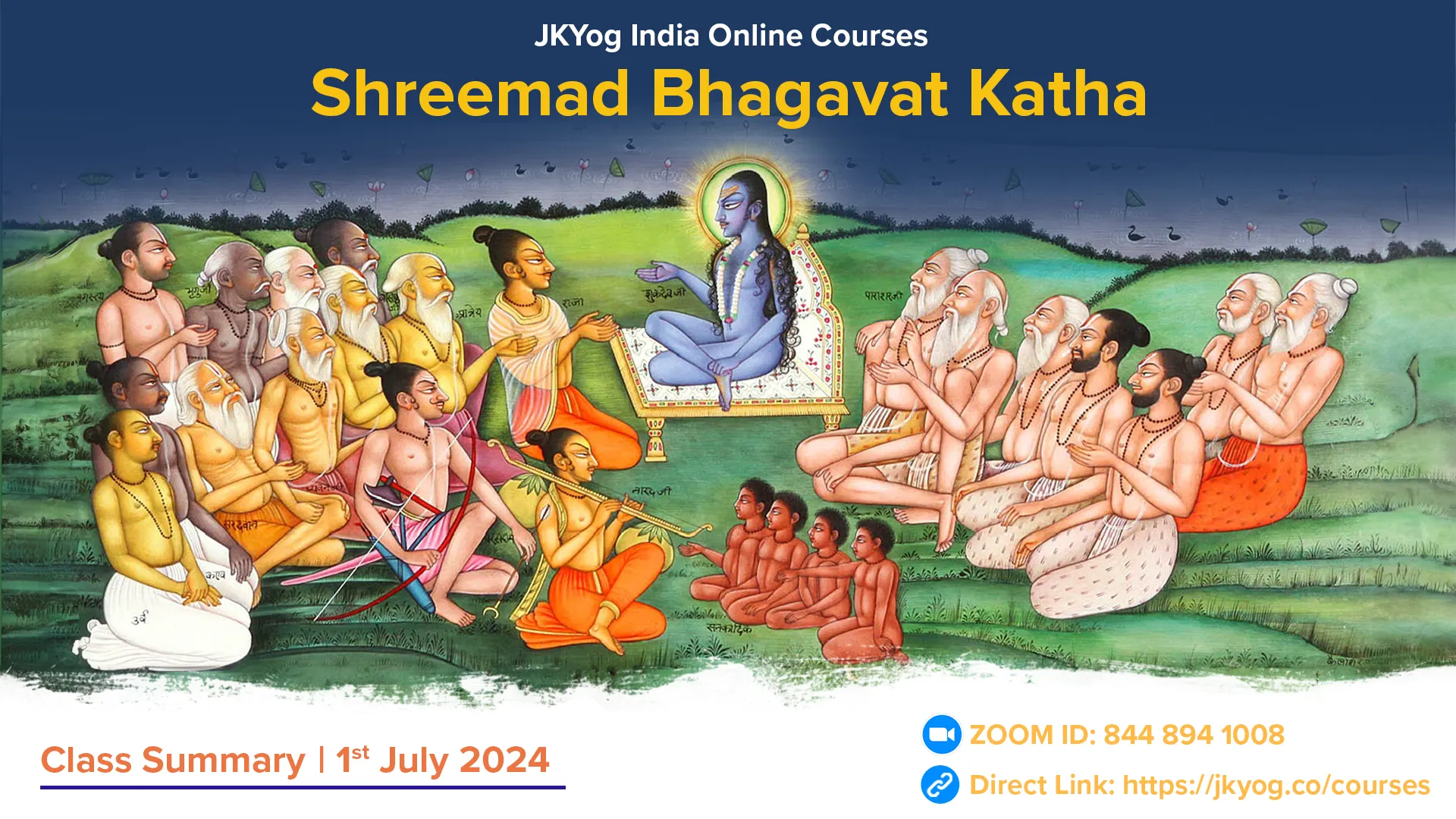

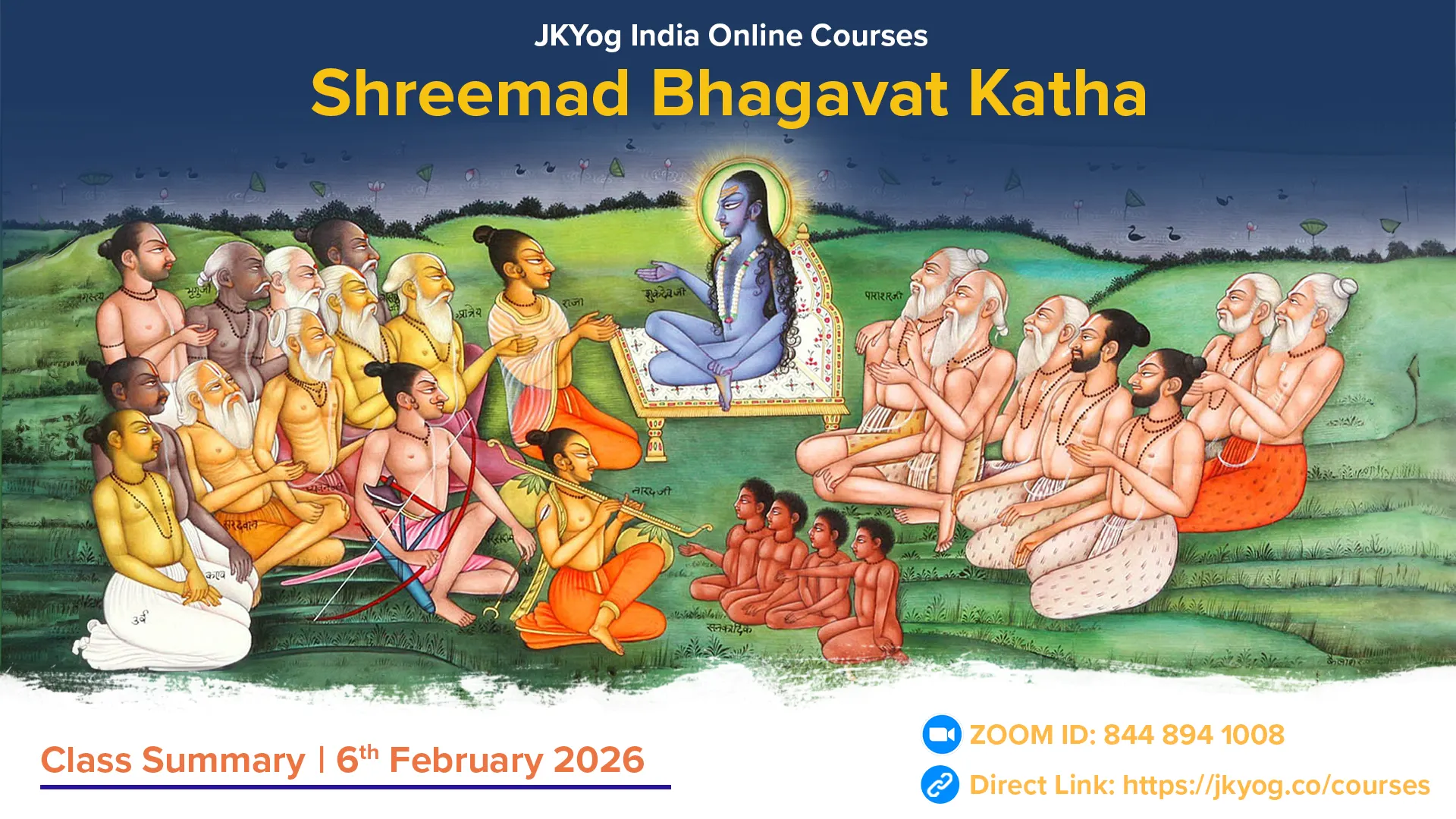
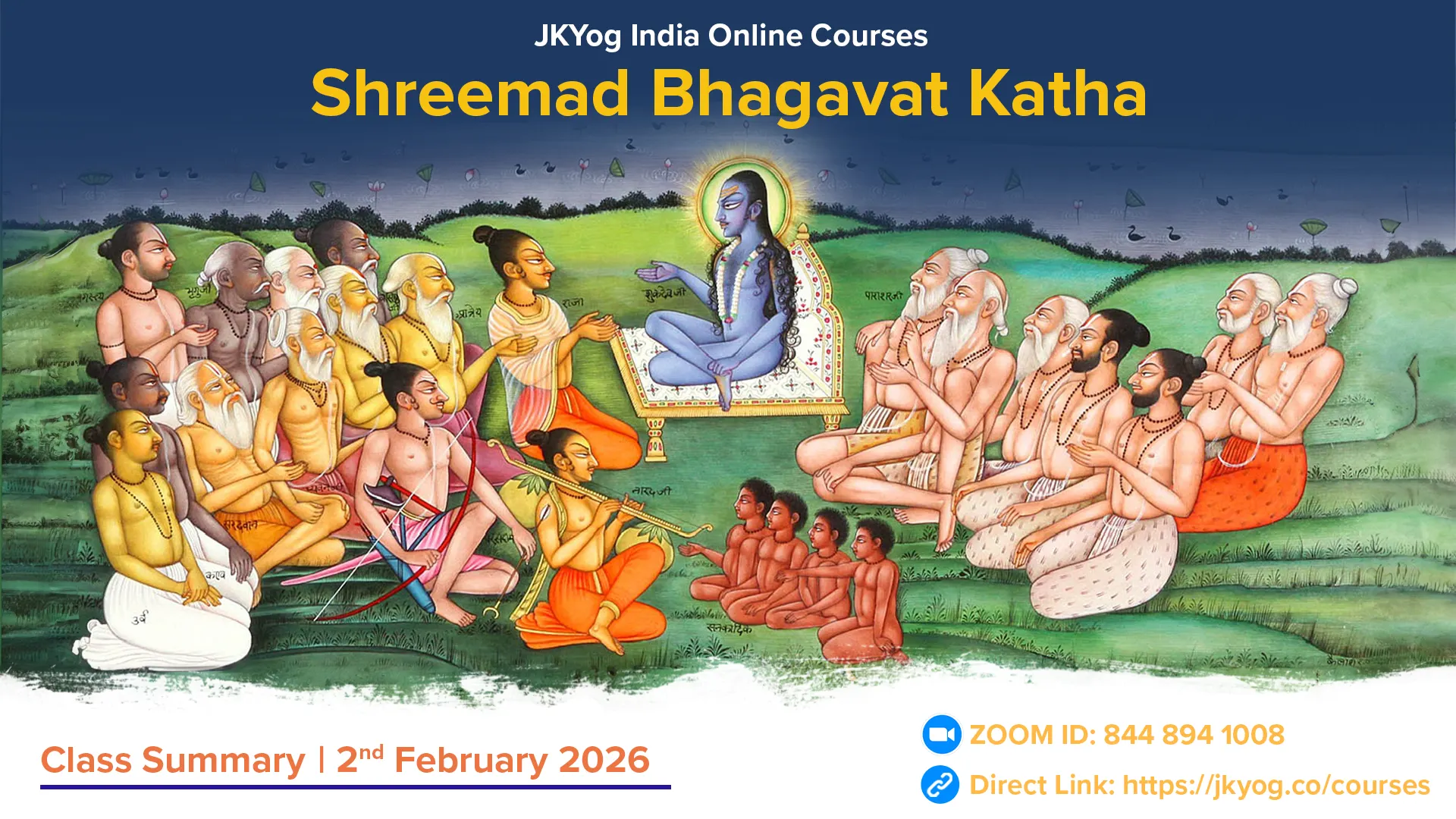
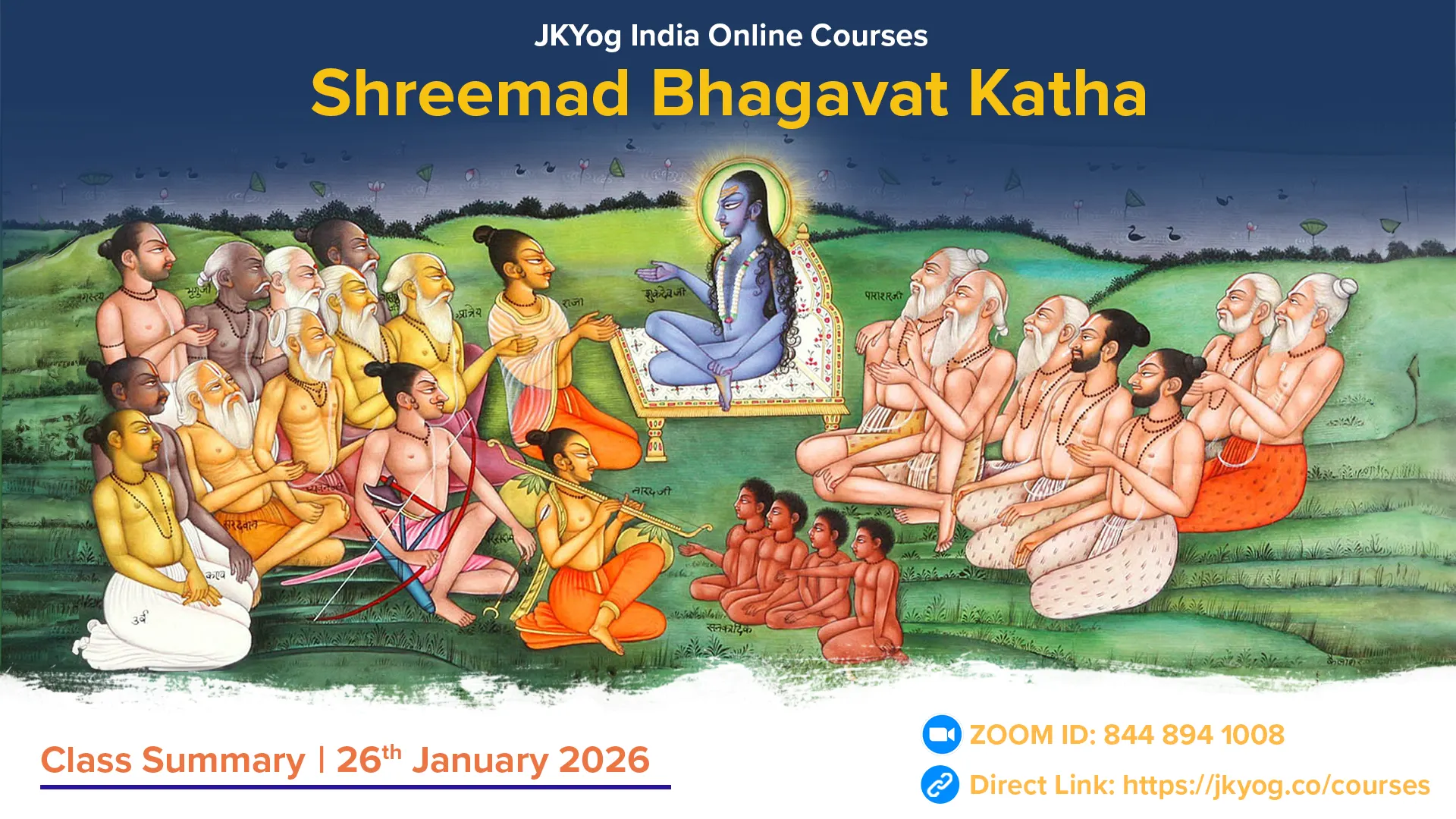
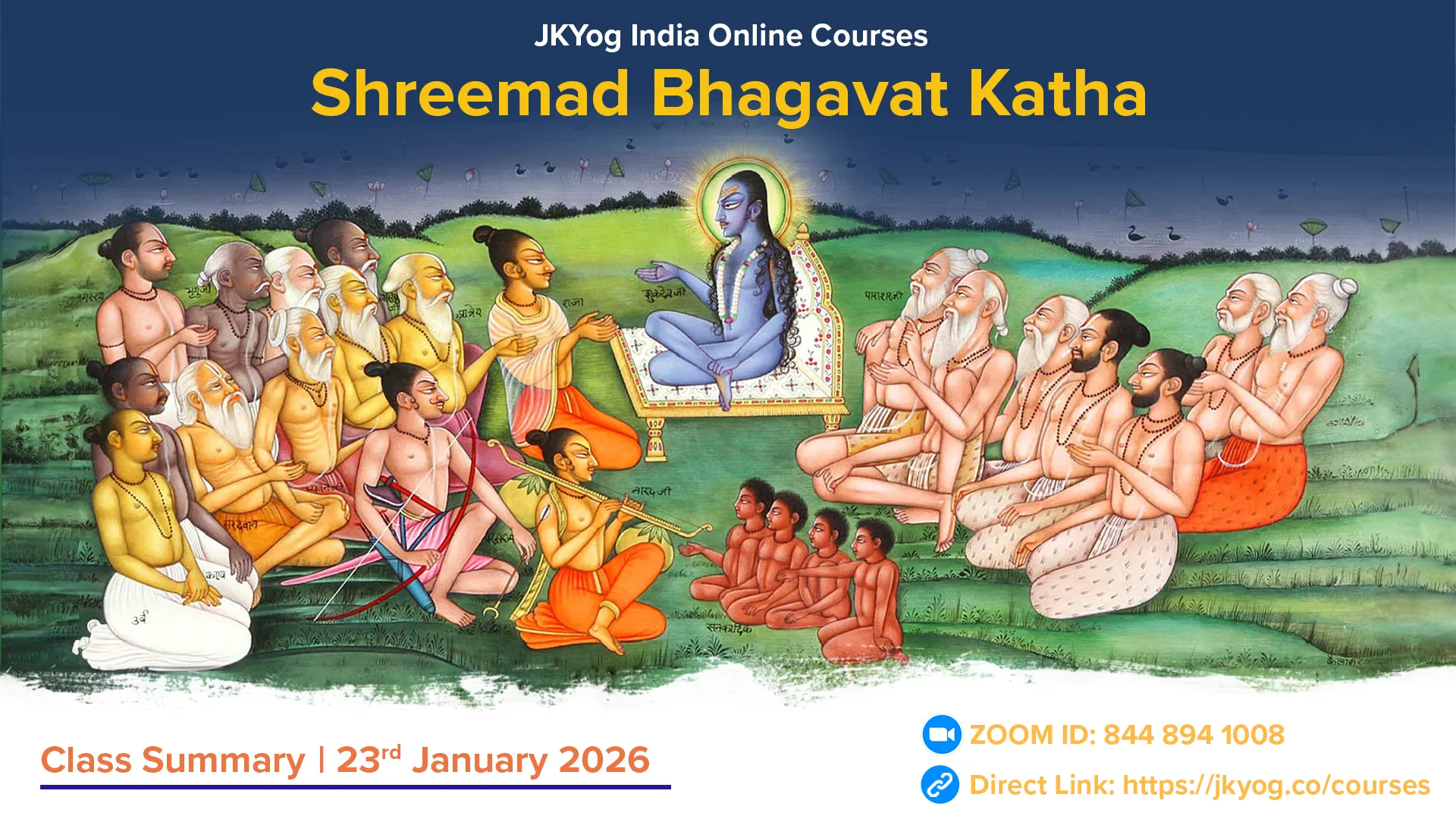
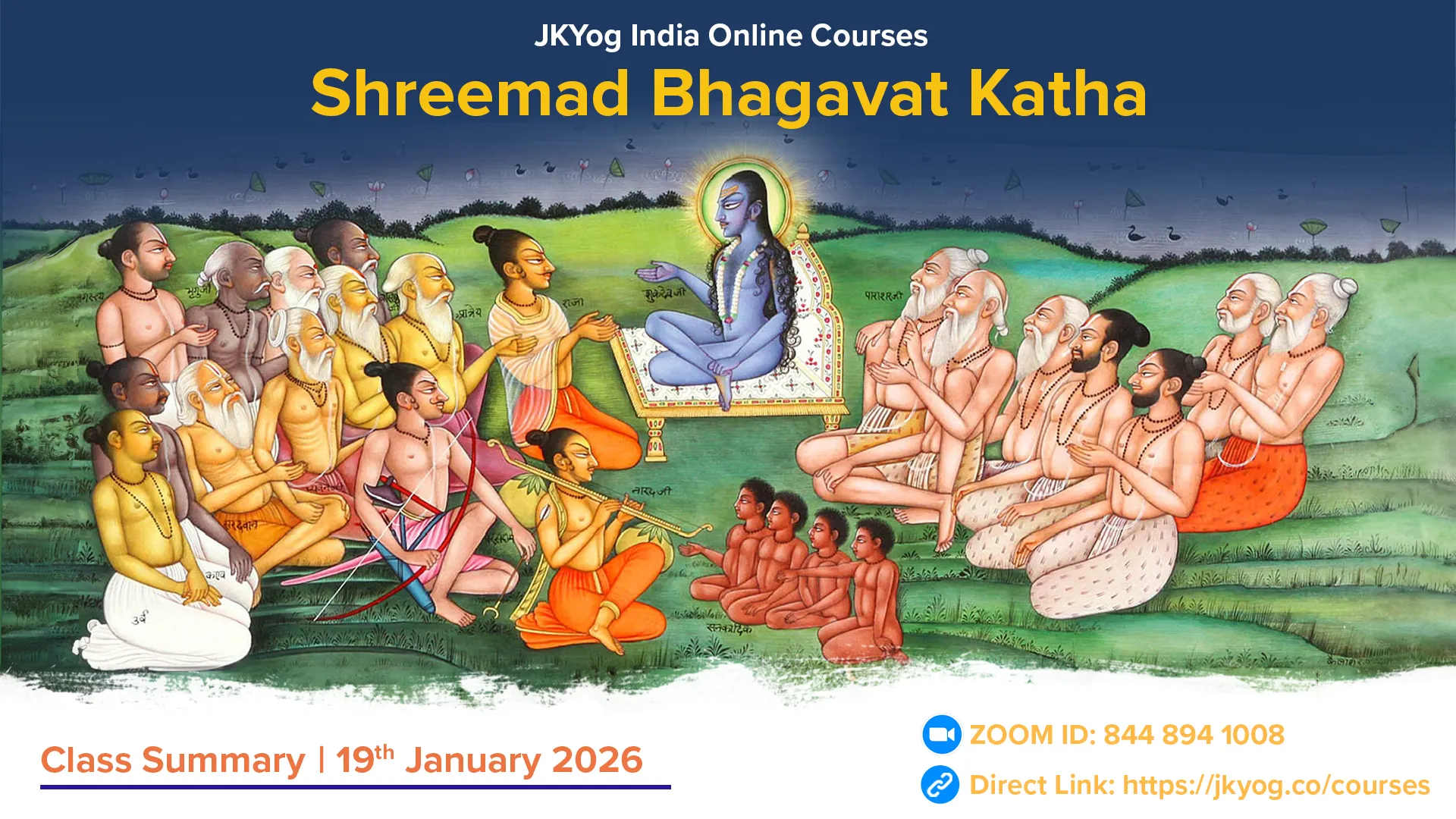
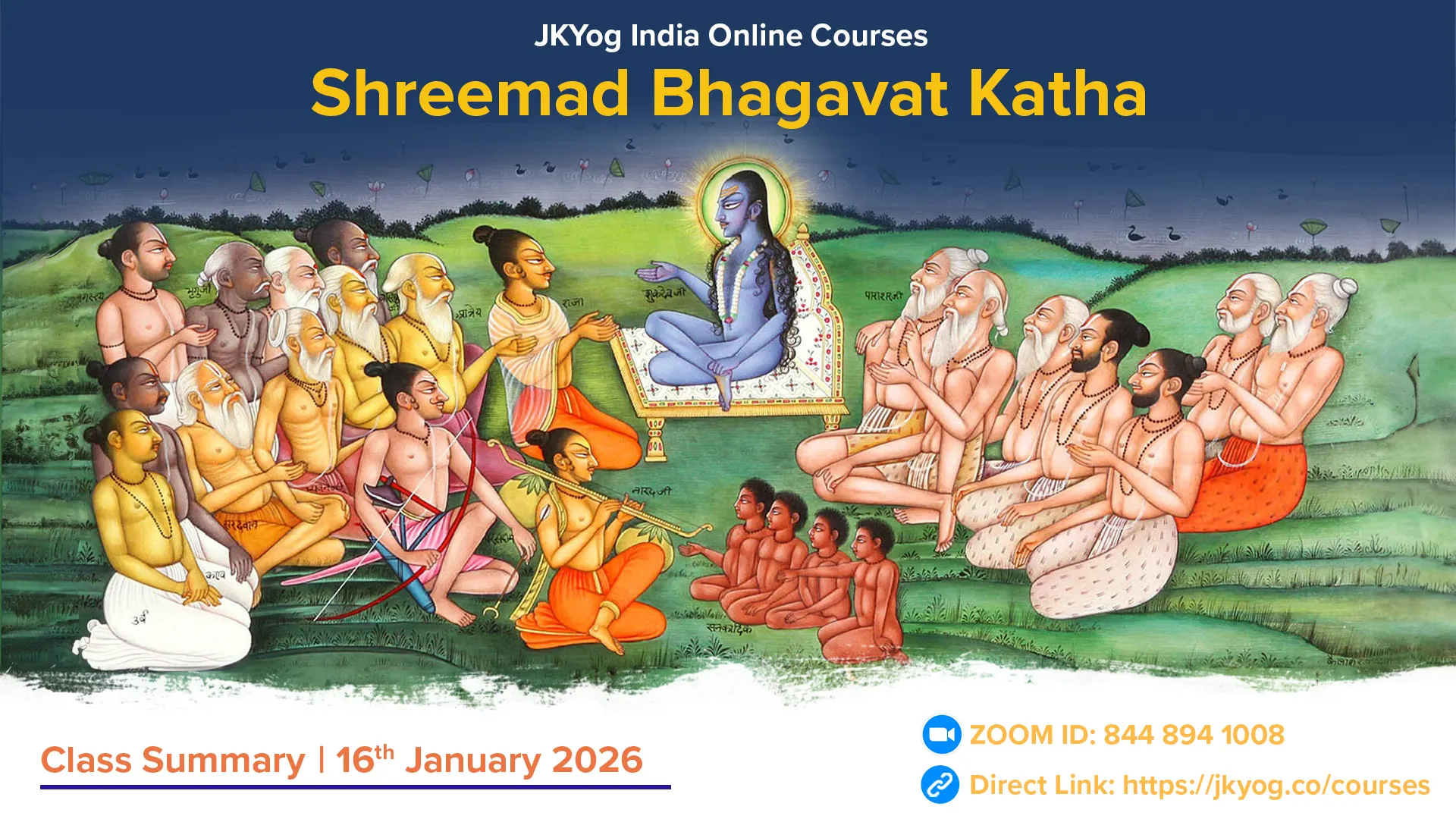
What our Participants say